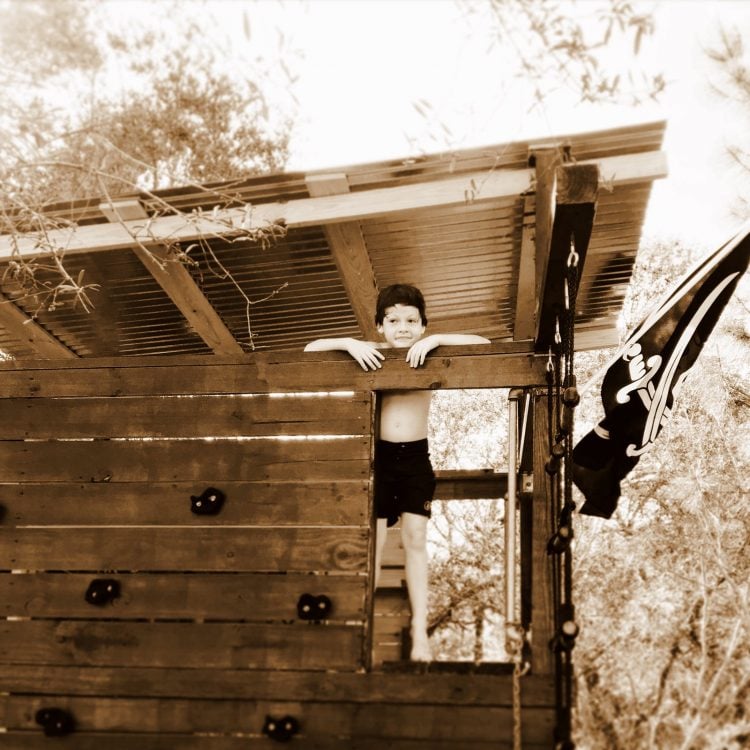It was a little getaway that you built (maybe with some help) that could be a clubhouse or castle or spaceship or simply a place for a little peace and quiet. See how kids have made treehouses over the years here!
The old-fashioned joys of a treehouse (1960)
Article from the Santa Cruz Sentinel (California) August 9, 1960
Almost any parent will testify to the fact that children like a secret place out of the reach of grown-ups and know, too, that a treehouse holds a special sort of magic.

Tree houses can be built in about as many shapes and sizes as there are trees to hold them. In a tree with a single trunk, such as a pine, the plan often is to build a platform that surrounds the trunk.
In a tree where the trunk branches out, say in an apple tree, it often is possible to mount a platform between the branches and thus create a large floor area.

Then, too, one can put a roof on a treehouse or leave it open.
One idea is simply to build a platform with a railing and a ridgepole over which a tarpaulin can be pulled in bad weather. This can work particularly well in the apple tree type of treehouse.
However, a solid roof has advantages and can give a tree house a highly individual look. It may be shingled, or a builder can use lap siding as roofing for an unusual effect.
ALSO SEE: 47 dangerous old playgrounds that our great-grandparents somehow survived

This is particularly attractive if the treehouse is built in what is known as an A-frame design.
This design features a roof that runs from the ridgepole right down to the edges of the floor, thus eliminating walls.

The basic frame or foundation of a tree house can be made of two-by-fours.
A softwood, such as one of the varieties of wood from the western pine region, is a good choice because all these are economical and easy to work.

Wall framework and railings also can be built for the most part with two-by-fours, and the floor and walls, if there are to be walls. can also be made of western pine region lumber.
Most tree houses require a ladder unless the house is near the ground and in an easy-to-climb tree.
MORE: See this adorable vintage-style two-story backyard playhouse from the ’60s
The Western Pine Association warns against the slapdash “ladder” consisting of pieces of wood nailed to the trunk of the tree.

Such rungs can pull away from the trunk or splinter from use, and this can lead to accidents. Furthermore, the nails will damage the tree.
A proper wooden ladder can be run up through a hole in the treehouse floor or up over the edge of the platform.
In either case, it would be wise to extend it a few feet higher than the floor. This will give children some extra rungs to hold onto when they step off the ladder onto the treehouse floor.

REMEMBER THIS? Say, Say, Oh Playmate: We traced the story of this old song and hand clapping game, and have the lyrics
Another safety precaution is to nail the upper end of the ladder to the treehouse frame so that it cannot fall.
If the children want a ladder they can pull up after them, it is possible to fit it, and the beam or brace to which it is to be fastened, with hooks and eyes. These will keep the ladder from slipping.
A vintage tree house for grown-ups (1961)

ALSO SEE: 47 vintage backyard ideas you’ll want to re-create for a relaxing sixties-style outdoor vibe
‘Not all tree houses are for the birds’ (1968)
By Lester C. Haas — The Shreveport Journal (Shreveport, Louisiana) June 29, 1968
Is youth wasted on the young? In many instances, yes, but not on a youngster who’s master of a treehouse.
The gleam in his eye will tell you that this is no dilapidated crate. This is a castle on the Rhine or Tarzan’s abode in the wilds of Africa!

There are treehouses and there are treehouses. Too often, they are hastily conceived, shoddily built, unattractive and dangerous to occupant and passerby.
Since children will build treehouses, with parental guidance or without, let’s see if we can design one that is both safe and good-looking. It will provide just as much fun as one that is neither.

The first thing to look for is a suitable tree. The ideal tree is one with multiple trunks or one that branches several feet off the ground, to provide supports for the floor in at least three places.
Don’t succumb to the temptation to throw a plank floor across a pair of horizontal branches. The floor won’t be level, and the branches will have a tendency to break.
The secret of building a good treehouse lies in getting the floor right. It should be strong, rigid and level.

Once you have found a good tree, measure the horizontal distance between supporting trunks or branches and purchase (or scrounge) the floor beams, which will extend from one support to the next.
ALSO SEE: Vintage Erector Sets were toys that made toys: See old sets & find out their history
If the length of the beam doesn’t exceed five or six feet, 2×6’s should make very nice beams.
The beams should be anchored to the supporting limbs or trunks with through bolts or plumber’s tape, a perforated metal house building. Get a big roll.

Don’t try to anchor main beams to the tree with nails. The tree’s movement in winds will pull them loose.
Use a level to make sure everything is on an even keel. Also, resist the urge to place the house too high. Five or six feet is plenty.

You should now have a roughly rectangular, or triangular, or odd shaped frame upon which to build your floor.
The floor itself need not be the same shape as the frame. It can overhang here and there and be square or round or T-shaped, the only limiting factor being the builder’s imagination.
MORE FUN: So long, tricycles, the Big Wheel’s here now: Kids loved these retro ride-on toys

The floor boards can be solid lumber or plywood. If plywood is used, it must be exterior grade. Three-quarter inch thickness can be used for boards spanning up to two feet.
For spans up to six feet, use 2x4s or 2x6s, laid flat. For greater spans, intermediate beams must be installed.
Nail the floor boards to the beams using two galvanized nails at each contact point; 8d nails for 3/4” boards, 12d for 2″ boards.

The superstructure can be anything from a simple rope rail, to full walls, with or without a roof. A couple of cautions are in order, however.
Some sort of rail must be provided, and openings in the rail should be small enough so that a hyperactive tenant (or visitor) can’t fall through.

Some sort of ladder will be required. Boards nailed across a single trunk, ladder fashion, are unsafe. The old knotted rope is picturesque, but hard to use and also dangerous.
A better solution is a simple ladder with 2×4 side supports and 1×2 treads let into the supports 10 or 12 inches apart.
MORE: Amazing DIY cardboard box fort & playhouse ideas from the ’60s

Bolt the ladder to the platform at the top, and bury the bottom end in the ground. Then it won’t move.
Be sure to led the ladder supports extend above the platform two or three feet, so the climber can pull himself up.
Treehouses built along these lines should be attractive enough to be seen in the backyard, safe enough to assuage the anxious parent’s doubts and, at the same time, retain enough “fun quotient” to satisfy the most critical of the treehouse set.

However, tree- houses, like swimming pools, do present a certain amount of danger, so a few rules should be rigidly enforced.
Children should not be allowed to use a treehouse until they are big enough to take care of themselves. Don’t permit rough housing or horsing around in your treehouse.
If friends will be using the treehouse, make absolutely certain that their parents know it and approve. Accidents can happen.
Is a treehouse architecture? I don’t know, but is sure is fun.

The huge treehouse: 37-room ‘house’ for only $75 with perfect cross-ventilation (1973)
From The Miami Herald (Miami, Florida) September 12, 1973
Eleven-year-old Shawn Peddie’s ambition to be an architect has taken him to new heights — atop a seven-story treehouse he has built.
The treehouse has 10 beds, 37 rooms and carpets and insulation in the bedrooms. The bathroom, on the ground floor, is the biggest room.
“We can see across the lake,” the fifth grader says. “One time I saw three alligators in the canal. Another time, I saw a man across the lake cutting grass.”
MORE: Mobile homes: The hot housing trend of the ’50s and ’60s
Shawn’s parents, Mr. and Mrs. J.K. Peddie, said during the summer neighborhood children “ate, slept and played in the treehouse or a nearby pool.”
“We never have to worry about sleeping space,” Mrs. Peddie said.
Shawn, who started construction seven months ago, said materials cost $75.

“One day I just decided I wanted a fort,” he said.
The treehouse has two exits — a slide from the second story to the ground and a rope that hangs from a branch 60 feet off the ground. Shawn prefers the rope when he leaves the lookout towers.
He is working on more exits — building a circular walkway to a ladder that leads to the towers.

His 7-year-old sister Tonya climbs to the highest tower.
Shawn spends all his time in the fort, his mother said. “He even takes his meals out there.”
The boy, who said he plans to be an architect, started building forts from twigs when he was 18 months old, and building treehouses with lumber when he was seven, Mrs. Peddie said.
ALSO SEE: Vintage playhouses & forts: Old-fashioned fun for kids




















2 Responses
Very impressed by that last story so I googled Shawn to see if he did indeed grow up to be an architect. Turns out he went on to become a professional skateboarder and owned a decorative concrete business so he ended up in a creative area of the construction field. Sadly he passed away in 2013 at just 51 years of age.
When I was growing up in the ’70s I lived near a wooded area where a lot of kids built treehouses. Usually they were little more than platforms made from a large plank of plywood garbage-picked or swiped from a construction site. Most of these treehouses were “owned” by groups of kids (almost always boys), and the only way anyone else could go up in them is if those kids weren’t around. It took some courage to go up in them, as the treehouses were always janky affairs that often just fell apart (I never heard of anyone getting injured from a treehouse collapse). If you made it up to a treehouse, you might find empty beer cans, a few old Playboys, or even some pot-smoking paraphernalia.